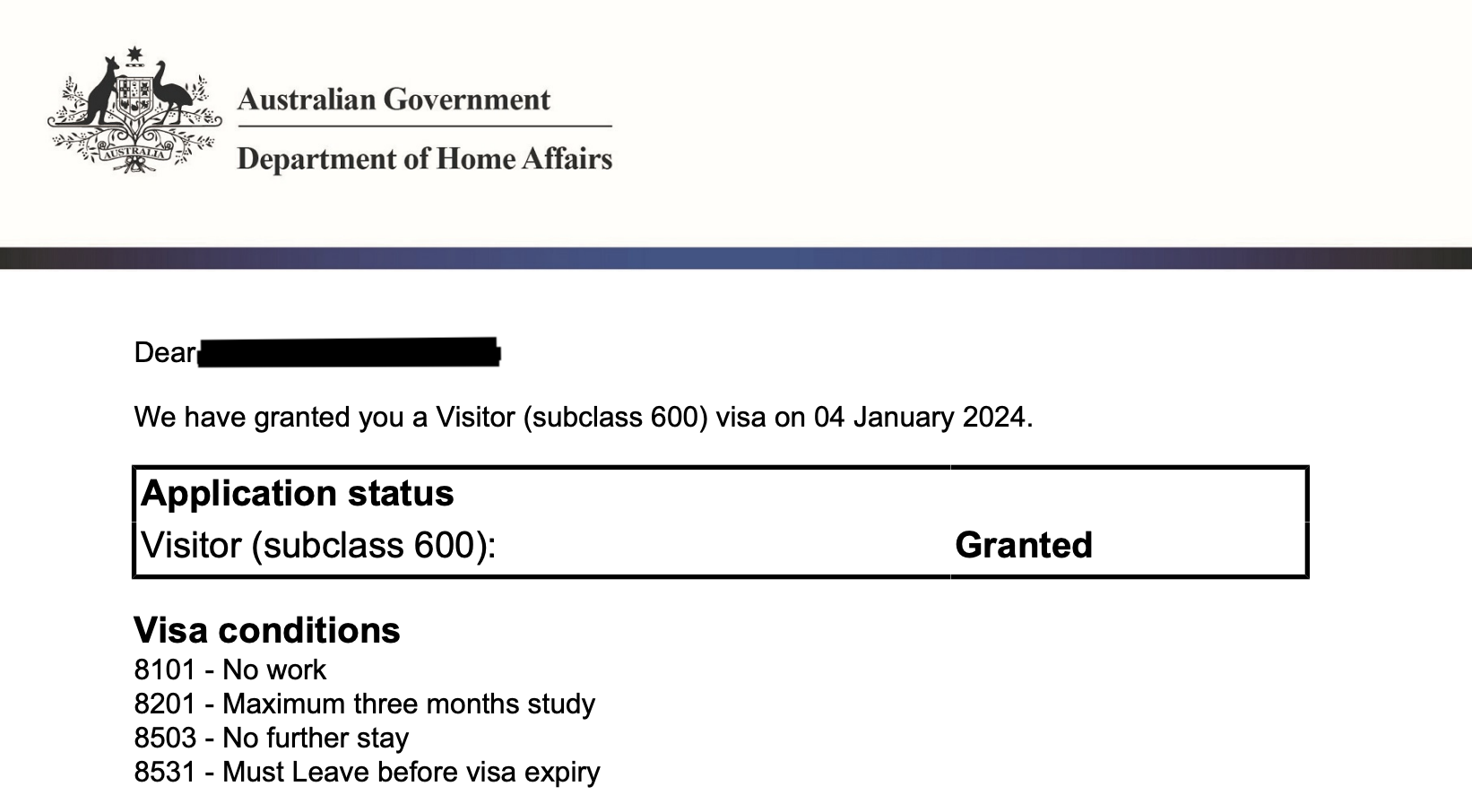
The 8503 condition - where to go from here
The 8503 Visa Condition, colloquially known as the "No Further Stay" clause, is a stringent legal mechanism designed to enforce temporary visitation periods.
In 2024, the Australian government has tightened regulations around student visas and increased scrutiny on visitor visas. While the core legislation hasn't changed, the implementation and enforcement of condition 8503 have become more stringent. It is now more crucial than ever to have a clear sense of the implications of this condition before attempting to apply for a visitor visa in Australia.
If you already hold a visa carrying condition 8503, you might be feeling overwhelmed and trapped. It's a tough position to be in, especially if you weren't fully aware of its implications when you accepted your visa.
While the Department of Home Affairs expects visa holders to understand all conditions, they may not realise how confusing and daunting this process can be for many people. At its core, the 8503 visa condition is like someone super-gluing shoes to your feet and saying, "Nope, you can't change into different shoes until you leave the house."
Whether you currently have a visa with a condition 8503 attached, or if you're planning to apply for a visitor visa, we will help you better understand your situation and options in this article.
What is Visa Condition 8503?
- The Basics:
- If you have condition 8503 on your visa, you cannot apply for most other visas while you're in Australia.
- You generally need to leave the country first before applying for a different visa, unless you are successful with a waiver which we will discuss below.
- The Fine Print:
- It's not just about being granted another visa – you actually can't even submit an application for most visas.
- There's one main exception: you can still apply for a protection visa if you are eligible.
Purpose and Application of Condition 8503
The Australian government uses this condition to ensure visitors stick to their original plans. It's their way of saying, "We trust you'll go home when you said you would."
Condition 8503 appears frequently on visitor visas and some student visas. It's always there on Sponsored Family Visitor visas – no exceptions. Sometimes, the immigration officer decides whether to add this condition. Other times, it's automatically applied – no human decision involved.
Identifying the 8503 Condition
How to spot it:
Check your visa grant notice – if you see the number 8503 under "visa conditions", it applies to you.

You can also use the VEVO (Visa Entitlement Verification Online) system to check your visa conditions.
Visas that Always Include 8503
The 8503 condition is mandatory on certain visa subclasses:
- Subclass 600 Visitor Visa (Sponsored Family stream)
- Subclass 600 Visitor Visa (Frequent Traveller stream)
- Subclass 600 Visitor Visa (Approved Destination stream)
Visas that Never Include 8503
The condition is never applied to:
- Subclass 601 (Electronic Travel Authority or ETA)
- Subclass 651 (eVisitor)
Eligibility for these visas depends on your passport country.
Visas with Discretionary 8503 Application
For many temporary visas, the condition is applied at the case officer's discretion:
- Subclass 600 Visitor Visa (Tourist stream)
- Working Holiday visas (subclasses 417 and 462)
- Training visas (subclass 407)
- Temporary Activity Visa (subclass 408)
Implications for Visa Holders
Understanding this condition is crucial because it can significantly impact your plans. It's not just a random number – it's a potential roadblock to extending your Australian adventure without leaving the country first.
The implications of condition 8503 are often overlooked. It's essential to carefully evaluate your future goals before agreeing to a visa with this restriction. Accepting it significantly narrows your choices moving forward.
The Waiver Process
While waivers are possible, they are granted based on specific criteria and situations. In the landmark case Thongpraphai v MIMA [2000] FCA 1590, the Federal Court of Australia provided crucial insight:
"What is required is an event or events that are far-reaching and most heavily persuasive."
This sets a high bar for waiver applications, emphasising the exceptional nature of circumstances required for a successful waiver.
Do I Have a Chance for an 8503 Waiver?
Use this simple decision tree to assess if you might be eligible for an 8503 waiver:
- Did your circumstances change after you were granted your visa? If Yes → Go to question 2. If No → Unlikely to be eligible for a waiver
- Are these circumstances beyond your control that resulted in a major change to your circumstances that may be seen as compelling and compassionate? If Yes → Go to question 3. If No → Unlikely to be eligible for a waiver
- Do these circumstances make it impossible or unreasonable for you to leave Australia? If Yes → You may be eligible for a waiver. Seek professional advice. If No → Unlikely to be eligible for a waiver
These are highly subjective criteria which are not defined in law by a list of pre-determined circumstances. As your case hinges on criteria that are not clearly defined in legislation, this lack of explicit definition is both a challenge and an opportunity. While it may seem to introduce uncertainty, it also opens the door for skilled advocacy to shape how these criteria are interpreted and applied. This is where legal expertise and familiarity with the application of recent case law becomes crucial.
What May Qualify for a Waiver
To give an indication, the department provides some anecdotal examples of "major changes" that are reasons for waiver:
- Serious injury or medical condition preventing travel
- Complications from pregnancy or childbirth
- Death or serious illness of close family requiring your presence
- Natural disaster in home country
- War or civil unrest in home country
What Does Not Qualify
Life events such as marriage, pregnancy, or the formation of new relationships are not considered valid grounds for an 8503 waiver, as immigration authorities classify these as voluntary decisions rather than circumstances beyond one's control. The desire to remain in Australia to submit a Partner Visa application is insufficient to justify waiving this condition. Furthermore, authorities will not accept claims of ignorance regarding the presence of condition 8503 on your visa as a basis for granting a waiver.
When planning your Australian Partner Visa application, it's essential to carefully assess your current visa status and any conditions attached to it. Consider your eligibility for visas without the 8503 condition and evaluate the feasibility of both offshore and onshore application pathways. Factor in your timeline and the logistical requirements for relocating to Australia as part of your decision-making process. For complex visa situations, particularly those involving the 8503 condition,
Before deciding to proceed with your waiver, we recommend seeking legal advice where you can discuss the specifics of the case with an experienced registered migration agent or lawyer so as to get a sense of how likely you are to succeed with your matter.
Need help with determining whether you can get a 8503 waiver or if you should apply for another visa? Have some burning questions about the 600 visa, 820 visa, 300 visa or 309 visa that are still unanswered? The content on this page does not constitute legal or immigration advice. Australian immigration doesn't have to be complex and we can help with your unique circumstances. To seek legal advice or information that is specific to your situation, please contact us.
